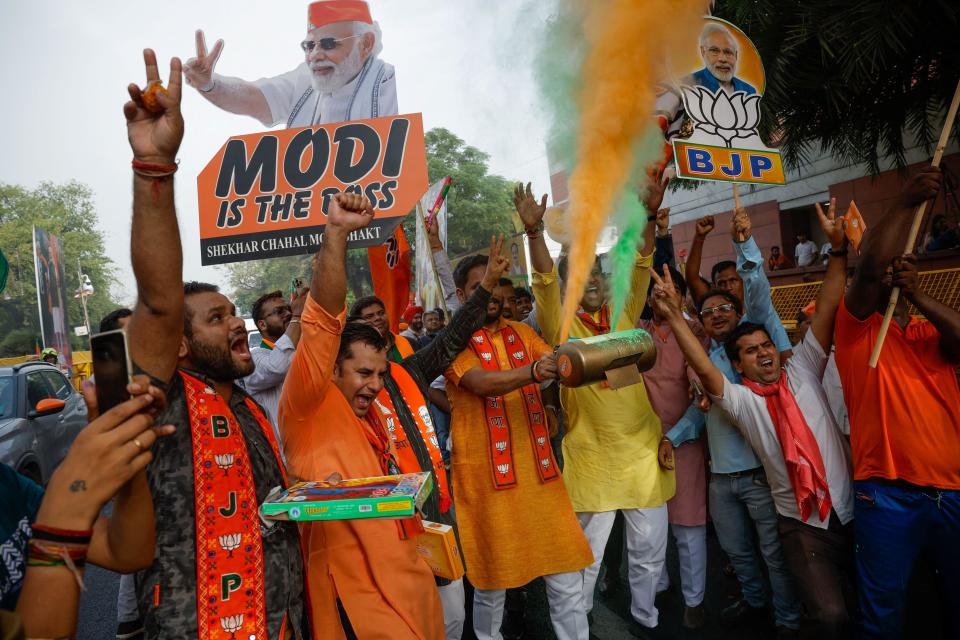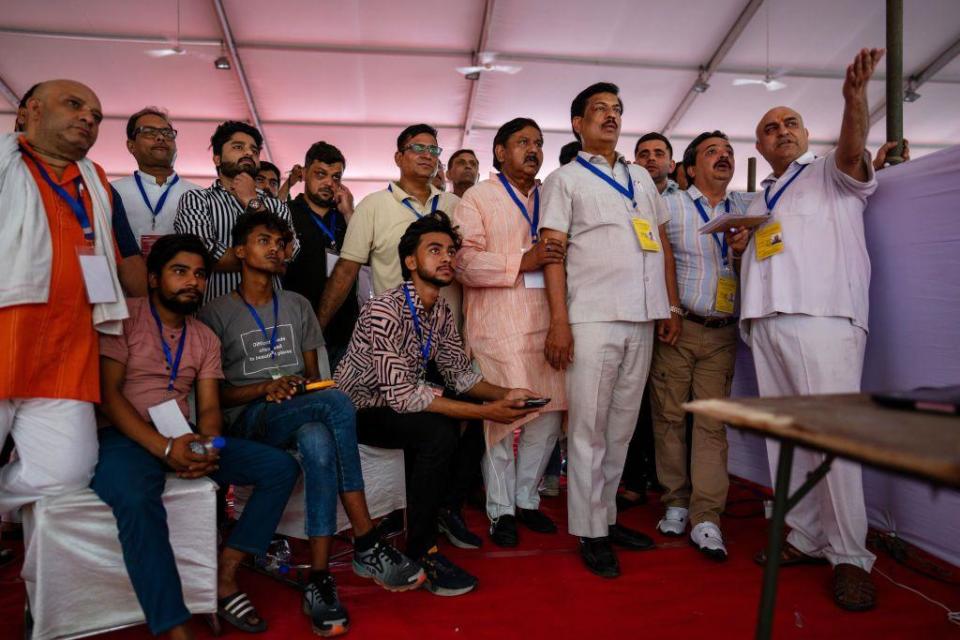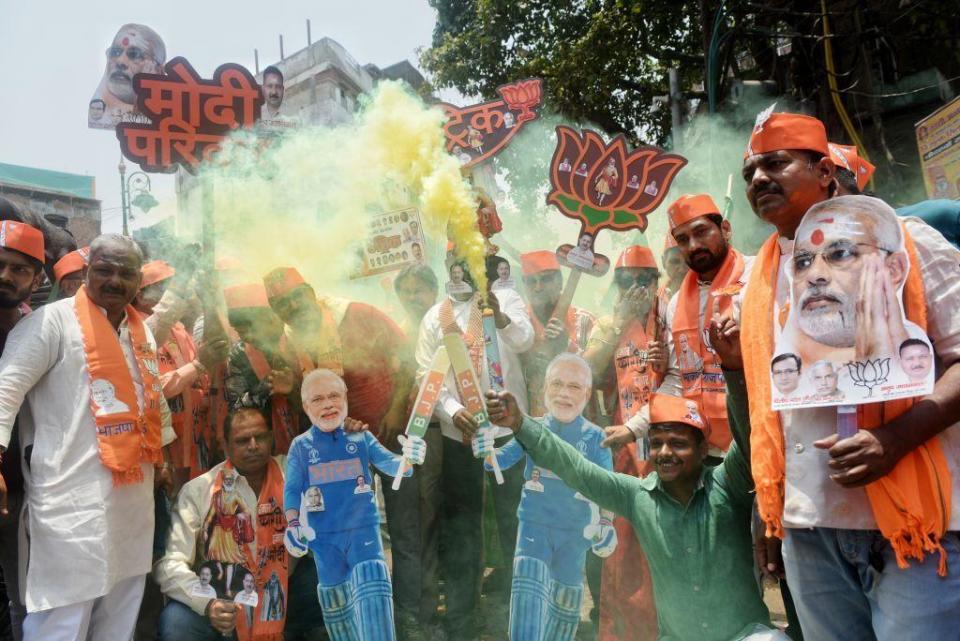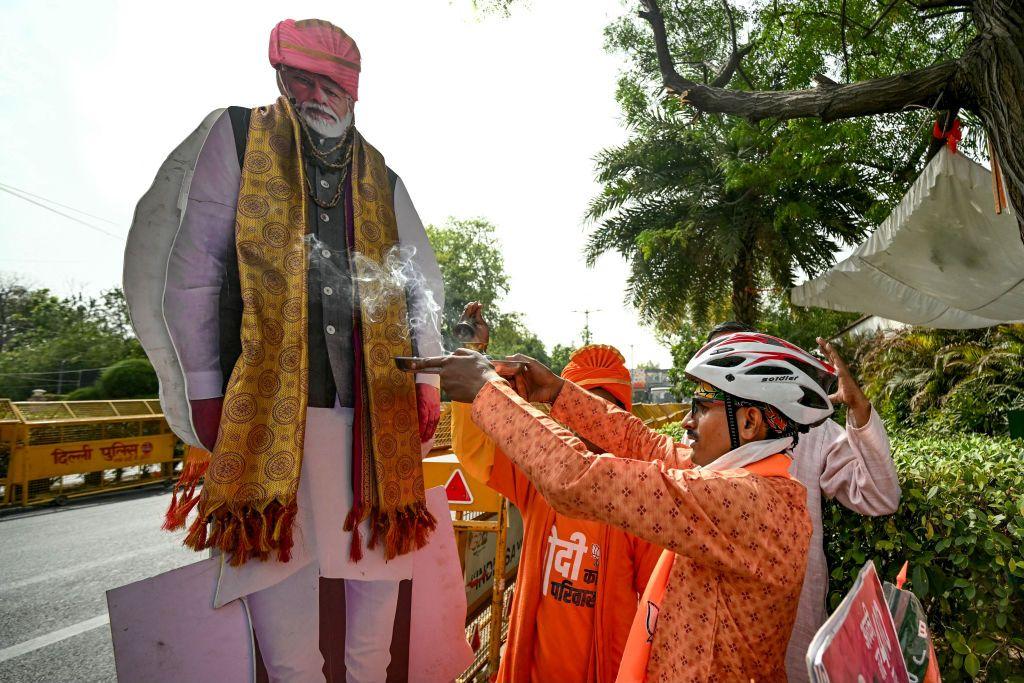When Narendra Modi set his sights on a barnstorming success – 400 out of 543 seats for his alliance – couple of discounted the aspiration.
After all, the Indian prime minister and his BJP have actually been a mostly unstoppable force because pertaining to power a years earlier.
However while Mr Modi and his alliance are on course to win a bulk, it is not rather the untouchable win he and his allies visualized when counting started today.
Listed below, BBC reporters in India offer their ideas on why we got to outcomes couple of anticipated – and what it might indicate for the world’s biggest democracy moving forward.
Concerns over usage of ‘Hindu card’ as a project tool
Faith is a consider every Indian election, and this one was no various.
Mr Modi inaugurated a Hindu temple at a questionable website that had actually been challenged in between Hindus and Muslims in January and this was anticipated to offer his celebration a huge increase throughout the election.
However nobody rather anticipated the BJP’s project to be as polarising as it was – or for a few of the most aggressive remarks to come from the extremely leading.
At a project rally in April, Mr Modi stated: “When their (the opposition Congress) federal government was in power they had actually stated Muslims have the very first right on the country’s wealth. This implies they’ll gather the wealth and offer it to whom? To those who have lots of kids. To moles.”
Some experts analyzed the remark as an effort by Mr Modi to galvanise his conservative Hindu assistance base.
However taking a look at the arise from some essential constituencies – the BJP prospect has actually lost in the temple city of Ayodhya – it doesn’t appear to have actually had preferred result.
Concerns are now being raised about utilizing the Hindu card as a project tool, specifically because what it appears to have actually accomplished is the opposite – unifying Muslim minorities versus the BJP.
‘Brand name Modi is starting to fray’

Marketing specialists have actually associated Narendra Modi’s long-lasting appeal to his proficiency of branding, changing regular occasions into eyeglasses and astute messaging.
“He strikes a deep chord with his aura of clearness and strength, speaks at the same time to stress and anxieties and goals, interacts utilizing mentally resonant metaphors, comprehends the power of branding essential efforts to produce a sense of activity and function and understands the power of enigmatic silence,” Santosh Desai, a popular brand name expert, composed in 2017.
Throughout the years, Mr Modi likewise offered himself as a cultural icon engaging a varied individuals both in your home and abroad, sealing his status as a prominent leader in Indian politics. A weak opposition and a mostly friendly media assisted him develop his brand name. “He’s popular culture in 70% of this nation,” a brand name expert stated at a conclave in 2015.
No longer. As outcomes of the basic elections reveal, Brand name Modi is starting to fray. Mr Modi has actually never ever underperformed and won less than a bulk in all the elections he has actually battled up until now.
It has actually been various this time. Tuesday’s outcomes reveal that a few of the shine might be wearing away and even Mr Modi is not unsusceptible to the vagaries of anti-incumbency.
4,200 mile opposition march ‘galvanised celebration cadres’
Given That the July 2023 development of the opposition INDIA alliance, a grouping of more than 2 lots celebrations, the Modi-led federal government has actually been painting it as a mangy lot of self-serving leaders out to personally target Mr Modi and ruin the nation.
While the leaders of the judgment BJP, together with the majority of experts and pollsters, had actually for months been anticipating a simple win for Mr Modi, the Congress-led opposition block kept stressing rural distress, inflation and widespread joblessness in its messaging and public conferences.
“The Constitution remains in threat” and the nation’s “democratic organizations are under attack” under a “dissentious” Mr Modi was their war cry.
A 4,200 miles (6,700 km) long march by Rahul Gandhi, a senior leader of the Congress celebration, that started months before the elections was greatly panned for its timing, however experts think it enthused fans and galvanised celebration cadres.
The opposition likewise upped its social networks reach and strongly handled the BJP which has for a very long time controlled the digital landscape in India.
Well-being plans of Modi competitors ‘much better link’ with citizens in southern India


Mr Modi’s BJP is still having a hard time to make a significant effect in southern India, although its vote share is set to increase.
It won 25 seats in Karnataka alone in 2019. However this time it is losing a minimum of 10 seats in the exact same state to the Congress celebration.
It is on the brink of doubling the 4 seats it won in Telangana and a number of seats in Andhra Pradesh since of its alliance with the local Telugu Desam Celebration, headed by the IT market friendly Chandrababu Naidu.
In Tamil Nadu, the local DMK led alliance is on the brink of duplicating its 2019 efficiency of a tidy sweep.
And in Kerala, the Communist federal government and the Congress-led front appear to have actually kept the BJP from the Lok Sabha.
Simply put, the advancement focused well-being plans of the non-BJP celebrations seem making a much better get in touch with the goals of the citizens down South.
So what next? Outcome might require Modi to ‘decrease’
Mr Modi forecasted himself as the voice of the Global South – a leader who served as a bridge in between the establishing and the industrialized world.
The Indian PM’s international heft was grounded in the huge assistance he had at home. He supplied a sense of connection to international leaders and alliances.
Mr Modi will now head a union federal government. He is most likely to have bipartisan assistance on diplomacy, however he will need to take allies into self-confidence before taking vital choices that impact international politics.
That may require him to decrease, and embrace a more consultative choice making policy.
Up until now India has actually certainly practiced its policy of tactical autonomy in foreign affairs, which may not alter.
However what will alter is Mr Modi’s capability to take fast choices on international affairs – something he typically did without consulting his own allies or the opposition.
Union federal government would be ‘base test’ for Modi


Be it as Gujarat state chief minister or as prime minister in his last 2 terms, Narendra Modi has actually run a complete bulk BJP federal government. Union partners did occurred to offer a hand, however the federal government’s future was never ever in their hands.
Present numbers plainly suggest the BJP is disappointing bulk which implies Mr Modi will look for assistance from allies. He has actually got utilized to running a centralised federal government and celebration under him which will need to alter keeping the brand-new truth in mind.
He will require to be a lot more conscious of the issues and level of sensitivities of union partners which doesn’t come simple to him, one expert kept in mind.
India is not brand-new to union politics, however union federal governments are typically vulnerable to instability. So it would be a base test for both Mr Modi and the BJP over their versatility to an altered circumstance.
